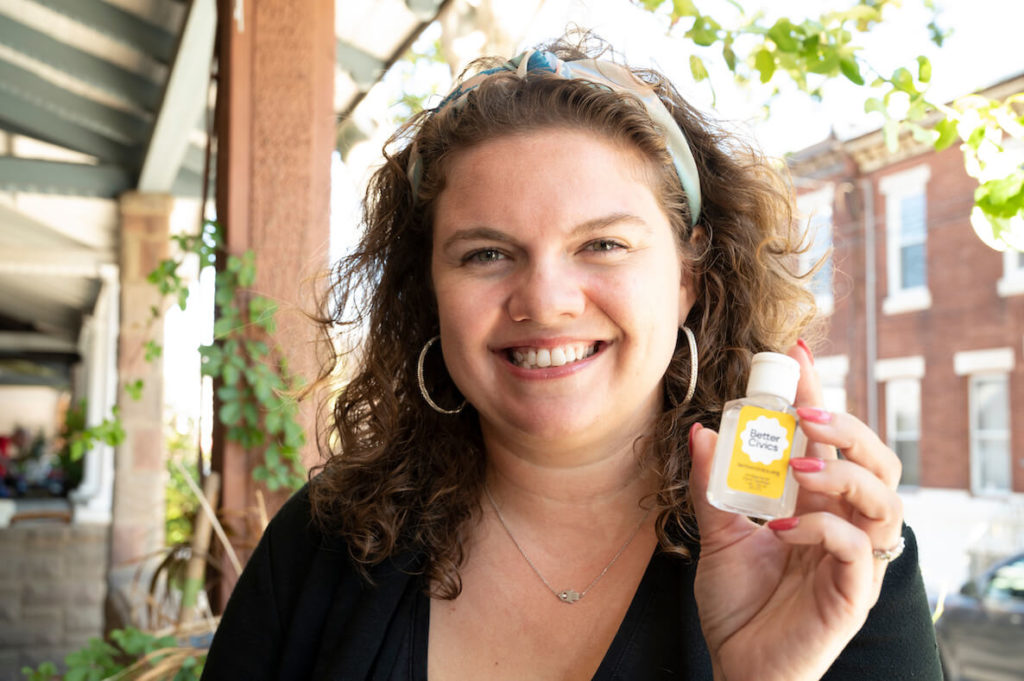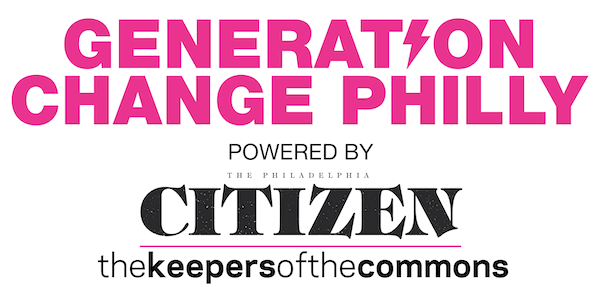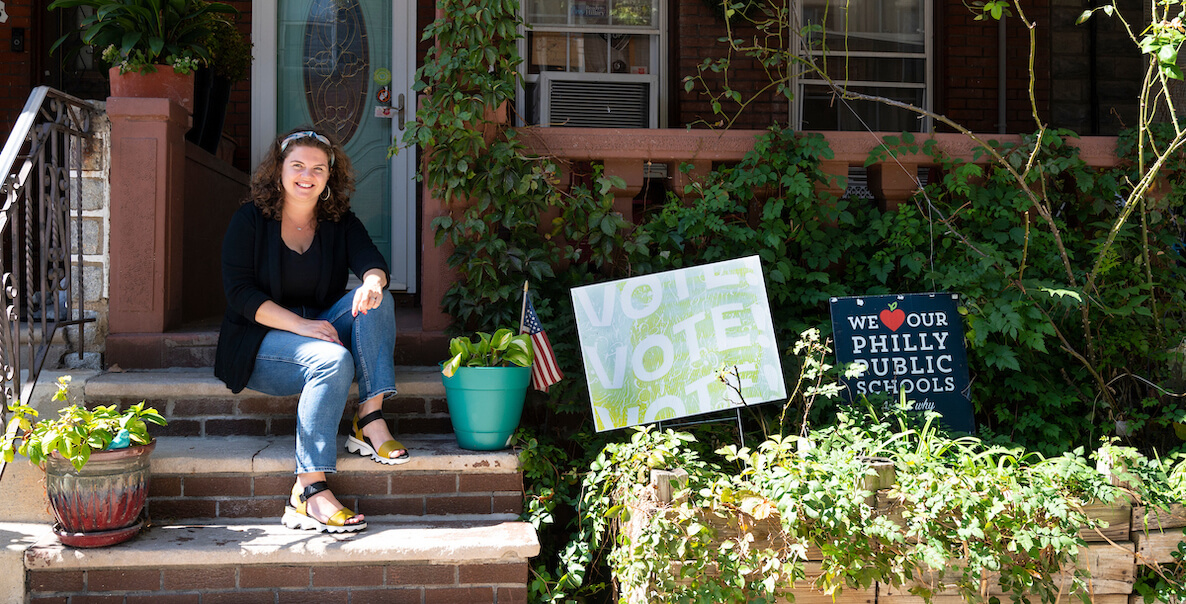There are in this city countless great and devoted Philadelphians who vote and who volunteer and who go beyond the usual call of duty to be good, engaged citizens.
And then there is Jen Devor.
Do you know her? You very well might: She’s one of those Philadelphians everyone seems to have a connection to, whose name just seems to float in the air around the city. That’s in part because Devor, 37, is a communications consultant and strategist whose work has landed her inside the Philly Venn Diagram of politics, civics, growth and … well, city stuff of all sorts. But that’s just for starters.
She’s also a block captain in her neighborhood of Point Breeze and a public school advocate. She is a onetime candidate for political office, a Democratic Committee Person, a frequent editorial writer with bylines here in The Citizen and the Inky, an advisory board member for WHYY and PA Youth Vote and her local rec center (among other organizations), a public speaker, a published author.
Most recently, she’s also the co-founder of a nonpartisan political nonprofit called Better Civics that aims to make being an involved, informed citizen way, way easier. And that’s an especially valuable public offering in a city where politics can get particularly complicated, says Alison Perelman, the executive director of Philadelphia 3.0.
The low-turnout problem, she believed (still believes), isn’t “voter apathy”: “It’s that people can’t care about what they don’t understand, what they feel disconnected from.”
For one thing, she says, we elect so many offices in this city that voters can feel overwhelmed. Ballots can feel opaque. It can feel as if “the city expects you to be ‘professionalized,’” Perelman says, “a sort of professional citizen, a professional Philadelphian.”
How do you know, for instance, on what criteria to choose your candidate for, say, Register of Wills? Or even your judges? Answer: You probably don’t. (And, hey, according to Devor and Better Civics, almost 20 percent of Philadelphia voters choose not to vote for judges at all.)
In short, Perelman says, “it’s a very, very high bar” that has been set for people who want to feel like informed, active citizens in their city. In trying to get good, digestible information to people, she says, and offering up clear paths for Philadelphians to be better and more involved citizens, “what Jen is trying to do with Better Civics is to bring that bar down to a more reasonable place.”
Better Civics is an extension of Devor herself: A dedicated, independent model of good citizenship who is looking to upend not just how we vote, but how we engage with the civic responsibilities of being a resident of Philadelphia. It’s this that puts her among our class of Generation Change Philly, our ongoing project with Keepers of the Commons aimed at spotlighting the people shaking up the status quo in this city.
RELATED: Read more about the Generation Change Philly project
“I Found My Calling”
Devor will tell you that she wasn’t always like this, such an overachiever, though that’s hard to believe if you’ve had even one conversation with her. She seems like the type—bright, relatable, eloquent—who would have been voted most likely to succeed in high school, or at very least, most school-spirited or some superlative that nods at her overall ebullience. But no, she says: Growing up in North Jersey, the daughter of a public school science teacher, she was actually the opposite. Not a joiner. Not an engaged student. “I almost failed out of high school,” she says. “I was skipping class, acting up, constantly getting in trouble.”
Eventually, though, a turning point came for her, via a senior year civics class. “It was probably one of the last civics classes to ever exist,” she jokes—though in reality, that’s a fair assumption. It was the teacher, she says, who put a great deal of emphasis on breaking down local elections, and explaining their importance. “It made me feel a sudden sense of ownership in my community and town,” Devor says. It also brought a new frustration to the surface when she realized not just how complicated and opaque our political system is, but also, as she says, “that that’s by design.”

These revelations sparked in her a new instinct toward civic and community engagement. They also pushed her to do well in that class, she says, which then led her to work on turning her other grades around in time for graduation. After high school, she’d go on to the University of the Arts here in Philadelphia to study media and communications, but not before winning two scholarships with an essay about civic engagement—one from her town’s Republican scholarship committee, and one from its Democratic equivalent. She won both awards with the same essay.
And voila: “It was like I found my calling.”
Even so, the idea and motivation for Better Civics was still a ways off at that point. Sure, she threw herself fairly immediately into the world of voter engagement (“I volunteered for Rock the Vote! Remember that? With MTV?”), but she spent the next several years building a career in advertising and later the nonprofit world that was separate from her political extracurriculars.
Why, she wondered, weren’t people using “the same tactics that we use to sell energy drinks and fashion brands and cars to sell the idea of civic engagement and voter participation?” There’s a formula there, Devor says. And it works.
As the years passed, though, those threads started to overlap. She grew increasingly confounded that the techniques employed in the marketing and communications world weren’t being put to use in voter engagement. Why, she wondered, weren’t people using “the same tactics that we use to sell energy drinks and fashion brands and cars to sell the idea of civic engagement and voter participation?” There’s a formula there, she says. And it works.
“Good copywriting, good design, engaging ways to interact with people,” she says. We’ve seen these tools work outside and inside politics—remember the Shepard Fairey HOPE poster from 2008? “And that was just one poster in one election,” she says. “Imagine what year round, smart advocacy could do for voting.”
Meantime, another puzzle piece was falling into place. In 2012, she’d been a fellow at the Center for Progressive Leadership, a nonpartisan program that brought together young leaders from across the state to learn about different municipalities. Among the many things she learned about in various Pennsylvania cities, the Philadelphia Office of the City Commissioners really stuck with her.
“We have this office, I was amazed to learn, that’s responsible for voter turnout and engagement,” she says. “We have three elected officials, each making six figures, each with their own office and staff. And yet, we have such low voter turnout in Philly.”
It was a moment like the one in high school, when a realization about the Way Things Are made her angry. “It’s not fair that this office exists and has access to such resources, and, like zero accountability,” she says. It felt like a wasted opportunity, and she thought at the time, Maybe I’ll run for this one day. The thought stayed with her for the next six years.
And why not? She’d worked in a number of roles that interacted with that office. She’d worked with the Committee of Seventy. She’d partnered with organizations all over the city. Even before she became a committee person, she’d started putting out an email she’d eventually dub “The Devor Report” highlighting and explaining all the seats involved in each election to friends and other interested parties, as well as explaining her own views and endorsements.
“It was really thoughtful,” Perelman says, “and she did a good job articulating why each election was important.” After a few years, The Devor Report circulated to some 1,200 people around the city.
RELATED: Chekeema J. Fulmore-Townsend is Philly’s intergenerational poverty buster
Beyond that, she’d also been an engaged citizen for years, a block captain, a poll worker many times over. “I knew where all the pain points were from a customer service aspect,” she says. Because that’s what she felt was needed: a customer-service approach to voting, wherein the consumers/voters are given easy access to everything they need to vote. The low-turnout problem, she believed (still believes), isn’t “voter apathy”: “It’s that people can’t care about what they don’t understand, what they feel disconnected from.” And that? That, she had some ideas about.
In 2018, she launched her campaign, hopeful that she’d be in office for the 2020 election, an election where Philly voters would play a crucial role. She wanted to turn that office into a public information agency, a centralized hub for all the many groups on the ground doing the GOTV work. She wanted to use her communications and marketing brain to help get real and clear information to voters, to leap the digital divide, to bump turnout and involvement, to partner with and equip the many established civic organizations in this city with the resources and content and smart printed materials, and “to help them activate events in an effective way.” She wanted to use that office as a perch to provide easy-to-understand, non-complicated information about voting and about the races that would make it easy to vote and to be a part of the system.
The Inquirer endorsed her in the race, as did State Representatives Jordan Harris and Elizabeth Fielder, plus the national organization “Run for Something.” In the end, though, she lost to Lisa M. Deely and Omar Sabir, who are currently, along with Republican Al Schmidt, our city commissioners.
“I told Jen at one point I thought it was a great thing she didn’t win, because she’d be able to affect change from the outside,” says Megan Smith. “And that’s where she’s going to make a difference.”
Fast-forward through the subsequent brief window of despondency (okay, fine, maybe she considered moving, just to make a point: “My husband was like, Nobody will give a shit,” she says, laughing). Devor soon realized that she didn’t necessarily have to hold an elected office to see her vision come to life. Campaigning had given her an opportunity to refine her ideas, to amplify them, to get comfortable with fundraising.
At that point, she says, it hit her: “I could almost just plug the same ideas into another venue.”
And so she did, which is how Better Civics—an organization with a year-round focus on making both voting and civic information more accessible and engaging—came to be.
“We Have To Create a System In Which We Remove the Barriers”
Better Civics launched as a nonpartisan nonprofit in the politically hellish, pandemic-burdened spring of 2020, which was actually perfect timing, not just because getting people information on how to vote felt so vital but also, Devor says, because it was relatively easy to raise money at that point: “Any civic leader in Philly got funding during that election.”
Still, Devor says, if it hadn’t been for the urging of her co-founder Megan R. Smith, founder and president of Brownstone PR, it wouldn’t have happened. “I would have never started Better Civics if Megan wasn’t pushing me,” Devor says. “She pushed and professionalized it.”
Smith, a well-known Philly PR dynamo, brought, among other things, her entrepreneurial savvy to the project. She was an early believer in Devor’s vision: “I told her at one point I thought it was a great thing she didn’t win, because she’d be able to affect change from the outside. And that’s where she’s going to make a difference.”
The two women first met at a fundraiser Smith had thrown for Devor during the campaign, and bonded over a shared belief that “if we’re going to have betters schools, better businesses, better families, better everything, then we have to create a system in which we remove the barriers”—those barriers of opacity, Smith elaborates, barriers designed to keep people from understanding who to hold accountable and how—“and meet people where they are, and give people the spaces where they can engage.”
They also agreed, Smith says, that it wasn’t just about voting: “That’s a one-day action,” she says. “What happens before we vote and what happens after, that’s the key.” At some point in the midst of these conversations, Smith agreed to partner up with Devor to get Better Civics off the ground.
The launch was a success: They partnered with other community organizations to host a series of get-out-the-vote events in neighborhoods across the city, wherein people could register to vote, apply for or hand in mail-in ballots, secure rides to the polls, or volunteer to work them. There was a DJ, free food from food trucks and branded hand sanitizer. Some 5,500 Philadelphians were served.
They also collaborated with Streets Dept blog’s Conrad Benner and All Voting is Local to launch a vote-by-mail poster project that would spread the word about mail-in voting: 15,000 posters, designed by three different Philly artists and printed in multiple languages, got both mail-in voting and Devor good local press.
This “slow” time between the hubbub of big, blaring election season is really her prime time, if you’re talking about the long game of shifting the paradigm of Philly citizenship. (And she is.) “It has to start when it’s quiet,” Devor says. “Now is the time to capture people’s attention.”
Another early win came in the form of Philly native Benj Pasek—Tony- and Oscar-winning composer (known for Dear Evan Hansen, among other things) and a friend of a friend of Smith’s—who “adopted” Better Civics, and funded their website. Then, last October, there was the star-studded “Good Things Happen in Philadelphia” hype video/fundraiser, featuring Philly-loving celebs like John Legend, Jake Tapper, Abbi Jacobson, Allen Iverson, and more encouraging Pennslyvanians to register and vote. “It was a crazy run,” Devor says.
Still, as necessary and providential as the launch timing and hoopla was, it’s the less sexy stuff —less high-profile elections and the day to day work of inspiring and nurturing more involved citizens—that’s Devor’s big-picture focus. It’s not as much about registering people to vote as it is engaging the people who are registered. (Consider: Even in the 2020 election, some 800,000 registered voters in Philadelphia didn’t cast a ballot.)
Devor wants to start there, in that gap, reaching voters before and between elections. Now that the project is up and rolling, it’s Devor who’s running the Better Civics show; as co-founder Smith says, “the reality is that this was Jen’s thing; this is the stuff she’s passionate about to her core.”
For Devor, that process starts exactly where it started with her back in school, with getting clear information to people. Beyond the pop-ups and posters, another smart way Better Civics is doing that is through its election toolkits, which are curated, nonpartisan information about upcoming elections (all nicely designed in succinct packets—that’s her marketing background coming through), filled with simple information and relevant, timely explanations. Better Civics distributes the toolkits through it’s civic partners (there are 52 organizations and counting, from Philly Youth Vote to SEAMAAC), which can distribute them to their own constituents and groups.
These days, that’s what she’s working on the most: toolkits for the upcoming November elections (it’s judges, DA and Controller, FYI). Well, that and fundraising. And growing her organization, and dreaming up cool ways to get local businesses in on the voter engagement game. (Stay tuned for more on that.) And thinking about the bigger picture, too, which will expand to include primers and resources on things like, say, jury duty and untangling the very tangled process of becoming a block captain and helping people feel more connected and involved in their city, because it’s all part of the same puzzle, see? (For now, you can simply see the Better Civics Resources page as a starting point.)
In short, Jen Devor is as busy and as engaged and as Jen Devor as she’s ever been. After all, this “slow” time between the hubbub of big, blaring election season is really her prime time, if you’re talking about the long game of shifting the paradigm of Philly citizenship. (And she is.)
“It has to start when it’s quiet,” she says. “Now is the time to capture people’s attention.”

The Philadelphia Citizen is partnering with the nonprofit Keepers of the Commons on the “Generation Change Philly” series to provide educational and networking opportunities to the city’s most dynamic change-makers.
Generation Change Philly: The Intergenerational Poverty Buster
Header photo: Jen Devor outside her Point Breeze home | By Sabina Louise Pierce




